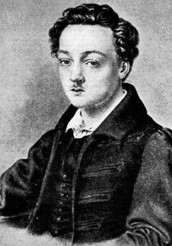HUMS 414, Georg Büchner’s Revolutions

Course Description:
German Romantic writer Georg Büchner (1813-1837) combines two revolutions in his small but unique work. There is the political and social revolution about which he writes (the French Revolution, 1789) and for which he works (the French and German revolutions 1836), and there is the literary revolution which takes place in his writing, a revolution that departs from the Romanticism of his days but dates back to Shakespeare’s History Plays on the one end and, on the other, comes to fruition only ca. 1900, in European modernism.
Close readings of all of Büchner’s works are the basis for doing justice to both revolutions equally. Three of these works are for the theater: Danton’s Death, a drama or tragedy re-enacting a phase of the French Revolution; Leonce and Lena, a Romantic Comedy and political satire; and Woyzeck, a theatrical play which does not fall into any conventional genre and can be best characterized as post-dramatic, a genre of our own time. Lenz is a narrative inventing the modern type of the anti-classical and anti-bourgeois, mad, poet. It was published in Büchner’s lifetime but became recognized for its pioneering narrative style only in the times of a Virginia Woolf, Robert Musil, or Marcel Proust. In the case of the theater play Woyzeck, the belated emergence in a different time and cultural environment has been even more radical. The scattered manuscripts were found only in the late nineteenth century, and the play came into public existence in the reconstructed version of the 1913 premiere. The impact the play had on the European theater (including Alban Berg’s first ‘literary opera’) cannot be separated from the work of reconstruction done by editors and directors in the first decades of the twentieth century. As much as the course highlights the uniqueness of Büchner’s own writing, it also is meant to due justice to this unusual long-term emergence of its meaning: from the Elizabethan history play of Shakespeare to the post-dramatic piece premiering in 1913.
Twentieth century poet Paul Celan’s reading of all of Büchner’s works captures and interprets their revolutionary style in a particular way; and his reading will be a guiding thread in our discussions.
There are two more important, non-literary, genres of thinking and writing in Büchner to explore: the political agitation of the pamphlet or manifesto – the Hessian Messenger – and the scientific work on physiological experimentation – the dissertation on the cranial nerves of certain fish. Both, the agitation and the scientific writing deeply impact Büchner’s later works. Lenz and Woyzeck are both based on psychiatric case studies, the narrative on the failing cure of the mad poet and the theater piece on one of the first cases of accountability in criminal psychiatry.
Studying Büchner’s two revolutions requires, together with close reading, contextualization, historically, genre-wise, and from different languages and periods. The combination of close reading and further literary, philosophical and political works is organized in four parts (for details see syllabus): The Invention of Freedom – Questioning Agency – The Production of the Human – Revolutionary Poetics.
Led By:
 |
Professor Rüdiger CampeIn 2021-2022, Rüdiger Campe is finishing a book length study on the German scientist and philosopher, author of the Sudelbücher (waste books) Georg Christoph Lichtenberg. He teaches a graduate course on Robert Musil and the Proseminar in Comparative Literature, and an undergraduate course on German Novels after 1945. |